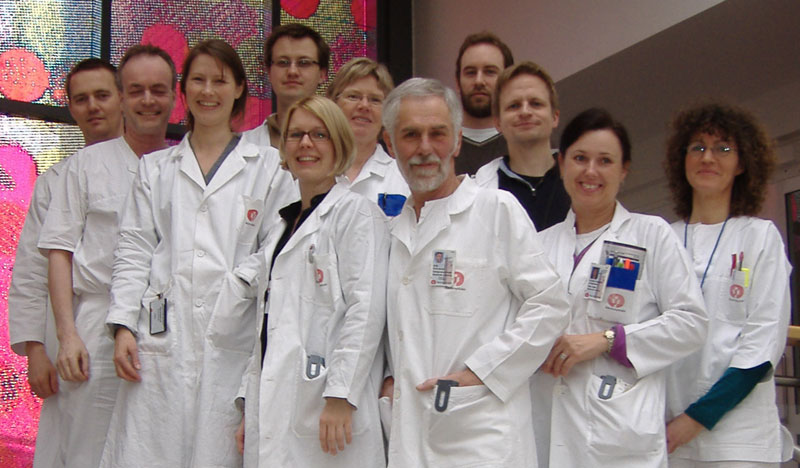Findings from Norwegian PSC Research Center published in Nature Genetics

An article from the Norwegian PSC Research Center - first-authored by Espen Melum (photo) and with Tom Hemming Karlsen as last author - will be published in the January issue of the highly rated journal Nature Genetics (journal impact factor 35.28).
Other authors from Oslo University Hospital include Kirsten Muri Boberg, Johannes Roksund Hov, Kristian Holm, Jon K. Lærdal and Erik Schrumpf.
The paper is entitled "Genome-wide association analysis in primary sclerosing cholangitis identifies two non-HLA susceptibility loci" and is now available in "online advance" form.
Summary of the findings (from the authors):
Using a genome-wide association study design, researchers from the Norwegian PSC Research Center have identified new disease genes for primary sclerosing cholangitis (PSC). PSC is a severe inflammatory disease affecting the biliary tree, and is currently the leading indication for liver transplantation in Scandinavia. Like most autoimmune diseases, different HLA variants increase the risk for PSC. However, other disease genes have until now proven very hard to identify.
In a genome-wide association study, genetic variants throughout the genome are analyzed for disease association in a large number of patients and healthy controls. This method has been successful in identification of disease genes in complex diseases; i.e. diseases presumed to be caused by both genetic and environmental factors. In the present study, the researchers were able to analyze close to 2.5 million variants in 715 PSC patients and 2962 healthy controls. The researchers state that international collaboration was absolutely necessary to collect the required number of patients, and samples from Sweden, Germany, the Netherlands, Belgium, United States and Norway were genotyped in the study.
Two genetic loci demonstrated convincing evidence for association both in the genome-wide analysis, as well as in a replication analysis. These two loci encompass the two likely disease genes MST1 and BCL2L11, respectively. Both genes are involved in the immune response. The MST1 gene encodes a protein involved in activation of macrophages and has, interestingly, also been found to be associated with ulcerative colitis, a condition seen in up to 80% of PSC patients. The BCL2L11 gene encodes a protein called BIM, which plays a role in apoptosis of autoreactive lymphocytes; variants in this gene region have so far not been reported in any autoimmune disease. The BCL2L11 locus was investigated further in a bim knockout mouse model (i.e. mice lacking the Bcl2l11 gene). Compared to normal mice an increased presence of infiltrating lymphocytes was found in the portal fields of the bim knockout mice.
As the effect sizes of the identified genetic variants are low, they cannot be used in a clinical setting, but they highlight pathways involved in disease pathogenesis. Taken together, the findings in this study identify two new disease genes for PSC, and along with the known HLA association, further support the hypothesis that PSC has an autoreactive component.
From right research nurse Mona Skevig, PhD student Kristin Kaasen JÝrgensen, PhD student Johannes Roksund Hov, bioinformatics scientist Kristian Holm, professor Erik Schrumpf, head physician Kirsten Muri Boberg, in charge of biobank: bioengineer Hege Dahlen Sollid, post doc Espen Melum, bioengineer Bente Woldseth, professor Lars Aabakken and group leader Tom Hemming Karlsen. Bioengineer Liv Wenche ThorbjÝrnsen and the researchers Trine Folseraas, Kim Andresen, Bjarte Fosby, Sigrid Nśss and Alexey Shiryaev are also connected with the group.
Links:
Genome-wide association analysis in primary sclerosing cholangitis identifies two non-HLA susceptibility loci.
(link to PubMed)
Melum E, Franke A, Schramm C, Weism√ľller TJ, Gotthardt DN, Offner FA, Juran BD, Laerdahl JK, Labi V, Bj√∂rnsson E, Weersma RK, Henckaerts L, Teufel A, Rust C, Ellinghaus E, Balschun T, Boberg KM, Ellinghaus D, Bergquist A, Sauer P, Ryu E, Hov JR, Wedemeyer J, Lindkvist B, Wittig M, Porte RJ, Holm K, Gieger C, Wichmann HE, Stokkers P, Ponsioen CY, Runz H, Stiehl A, Wijmenga C, Sterneck M, Vermeire S, Beuers U, Villunger A, Schrumpf E, Lazaridis KN, Manns MP, Schreiber S, Karlsen TH.
Nat Genet. 2010 Dec 12.
News article (in Norwegian) from Tidsskrift for Den Norske Legeforening:
Ny kunn­skap om pa­to­ge­ne­sen ved sjel­den gal­le­­­syk­dom
Home page of The Norwegian Primary Sclerosing Cholangitis Research Center (NoPSC)
